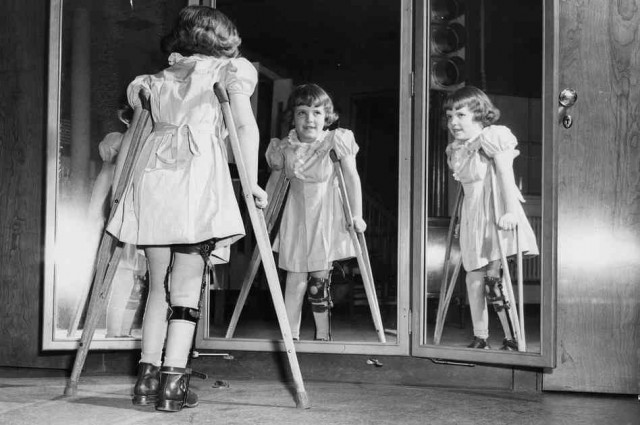
Take a hard look at the picture. These are images we don't see in this country at all anymore. But until the polio vaccine came along in 1955, children and adults paralyzed from polio were fairly commonplace. (FDR, anyone?) Today, vaccines are now a victim of their own success. Because they've so successfully wiped out devastating childhood illnesses, people seem not to fear those illnesses anymore. Now we have parents who decide not to have their children vaccinated.
As KQED News has reported this week, the number of parents in Marin County opting out of vaccines for their children is climbing. Last year, 7.8 percent of Marin parents opted out, 1 percentage point higher than the previous year. At present, California has one of the most lenient laws in the country to allow parents to decline vaccinating their kids: the "personal belief exemption." It's a short statement that says vaccinations are against a parent's beliefs. (A new law amends this exemption somewhat; more on that below.)
On Thursday, KQED's Forum took up the question of vaccines, and it was clear that many people remain confused on some key points.
1. What is herd immunity?
This simply means that enough people are vaccinated against a contagious illness that most of the community is protected -- including those who cannot be vaccinated, such as newborn infants and people with compromised immune systems. And there are a lot of people with compromised immune systems, including pregnant women, people being treated for cancer, HIV/AIDS patients and more. The percentage of people who need to be vaccinated to create herd immunity for many childhood illnesses is high -- 90 percent, according to the federal government's Healthy People 2020 goals. The National Network for Immunization Information draws a striking contrast between two outbreaks of measles. In 2003, an infected Japanese tourist arrived in the Marshall Islands, where vaccination rates were below 75 percent (i.e., below a herd immunity level). An epidemic ensued with more than 700 cases, 56 hospitalizations and three deaths. In the same year, there were two separate introductions of measles in Mexico. But vaccination rates were above 95 percent there. Only 41 people contracted measles as a result. Vaccination matters.